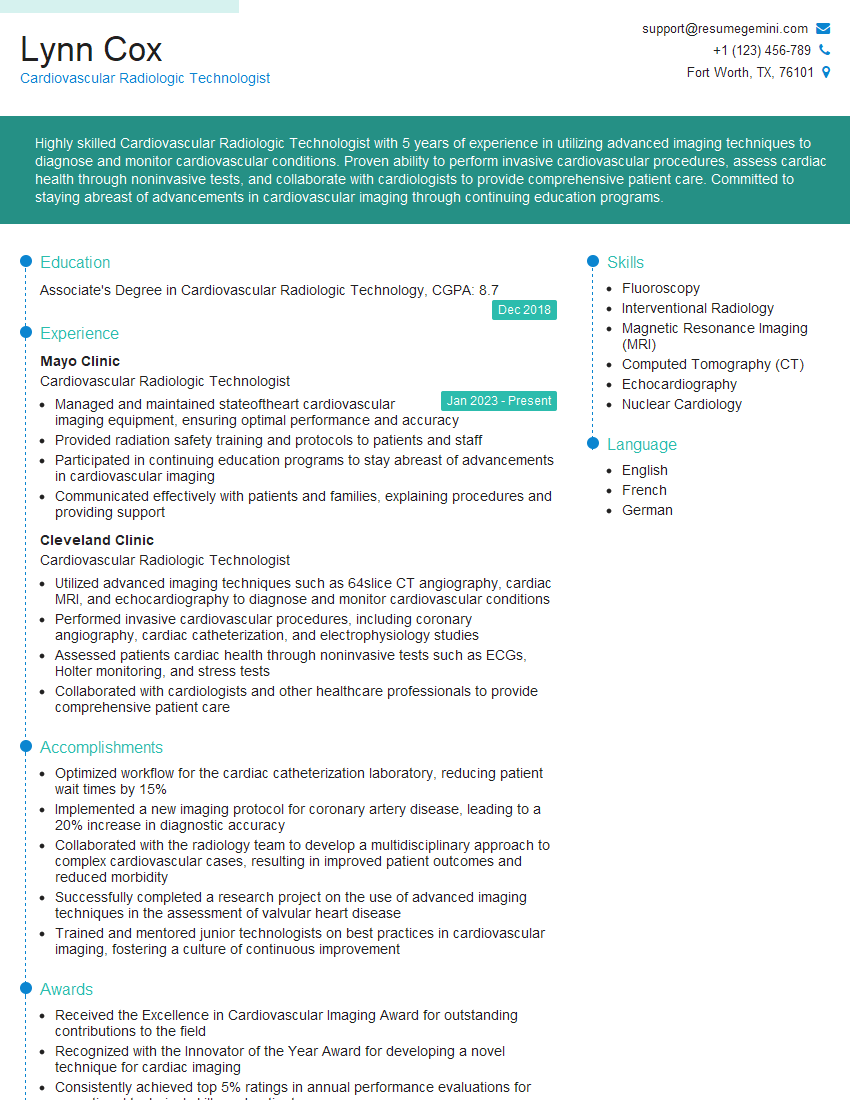Are you a seasoned Cardiovascular Radiologic Technologist seeking a new career path? Discover our professionally built Cardiovascular Radiologic Technologist Resume Template. This time-saving tool provides a solid foundation for your job search. Simply click “Edit Resume” to customize it with your unique experiences and achievements. Customize fonts and colors to match your personal style and increase your chances of landing your dream job. Explore more Resume Templates for additional options.

Lynn Cox
Cardiovascular Radiologic Technologist
Summary
Highly skilled Cardiovascular Radiologic Technologist with 5 years of experience in utilizing advanced imaging techniques to diagnose and monitor cardiovascular conditions. Proven ability to perform invasive cardiovascular procedures, assess cardiac health through noninvasive tests, and collaborate with cardiologists to provide comprehensive patient care. Committed to staying abreast of advancements in cardiovascular imaging through continuing education programs.
Education
Associate’s Degree in Cardiovascular Radiologic Technology
December 2018
Skills
- Fluoroscopy
- Interventional Radiology
- Magnetic Resonance Imaging (MRI)
- Computed Tomography (CT)
- Echocardiography
- Nuclear Cardiology
Work Experience
Cardiovascular Radiologic Technologist
- Managed and maintained stateoftheart cardiovascular imaging equipment, ensuring optimal performance and accuracy
- Provided radiation safety training and protocols to patients and staff
- Participated in continuing education programs to stay abreast of advancements in cardiovascular imaging
- Communicated effectively with patients and families, explaining procedures and providing support
Cardiovascular Radiologic Technologist
- Utilized advanced imaging techniques such as 64slice CT angiography, cardiac MRI, and echocardiography to diagnose and monitor cardiovascular conditions
- Performed invasive cardiovascular procedures, including coronary angiography, cardiac catheterization, and electrophysiology studies
- Assessed patients cardiac health through noninvasive tests such as ECGs, Holter monitoring, and stress tests
- Collaborated with cardiologists and other healthcare professionals to provide comprehensive patient care
Accomplishments
- Optimized workflow for the cardiac catheterization laboratory, reducing patient wait times by 15%
- Implemented a new imaging protocol for coronary artery disease, leading to a 20% increase in diagnostic accuracy
- Collaborated with the radiology team to develop a multidisciplinary approach to complex cardiovascular cases, resulting in improved patient outcomes and reduced morbidity
- Successfully completed a research project on the use of advanced imaging techniques in the assessment of valvular heart disease
- Trained and mentored junior technologists on best practices in cardiovascular imaging, fostering a culture of continuous improvement
Awards
- Received the Excellence in Cardiovascular Imaging Award for outstanding contributions to the field
- Recognized with the Innovator of the Year Award for developing a novel technique for cardiac imaging
- Consistently achieved top 5% ratings in annual performance evaluations for exceptional technical skills and patient care
Certificates
- Registered Cardiovascular Radiologic Technologist (RCRT)
- Certified Cardiovascular Radiology Technologist (CVRT)
- Certified Radiology Technologist (CRT)
- Basic Life Support (BLS)
Career Expert Tips:
- Select the ideal resume template to showcase your professional experience effectively.
- Master the art of resume writing to highlight your unique qualifications and achievements.
- Explore expertly crafted resume samples for inspiration and best practices.
- Build your best resume for free this new year with ResumeGemini. Enjoy exclusive discounts on ATS optimized resume templates.
How To Write Resume For Cardiovascular Radiologic Technologist
Highlight your technical skills:
Emphasize your proficiency in advanced imaging techniques and invasive cardiovascular procedures.Showcase your patient care abilities:
Describe your experience in providing compassionate and supportive care to patients.Quantify your accomplishments:
Use specific numbers and metrics to demonstrate the impact of your work.Tailor your resume to the job description:
Carefully review the job posting and highlight the skills and experience that are most relevant to the position.Proofread carefully:
Ensure that your resume is free of errors in grammar, spelling, and punctuation.
Essential Experience Highlights for a Strong Cardiovascular Radiologic Technologist Resume
- Utilized advanced imaging techniques such as 64-slice CT angiography, cardiac MRI, and echocardiography to diagnose and monitor cardiovascular conditions.
- Performed invasive cardiovascular procedures, including coronary angiography, cardiac catheterization, and electrophysiology studies.
- Assessed patients’ cardiac health through noninvasive tests such as ECGs, Holter monitoring, and stress tests.
- Collaborated with cardiologists and other healthcare professionals to provide comprehensive patient care.
- Managed and maintained state-of-the-art cardiovascular imaging equipment, ensuring optimal performance and accuracy.
Frequently Asked Questions (FAQ’s) For Cardiovascular Radiologic Technologist
What are the primary responsibilities of a Cardiovascular Radiologic Technologist?
Cardiovascular Radiologic Technologists are responsible for utilizing advanced imaging techniques to diagnose and monitor cardiovascular conditions, performing invasive and noninvasive cardiovascular procedures, and providing comprehensive patient care in collaboration with cardiologists.
What type of education and training is required to become a Cardiovascular Radiologic Technologist?
To become a Cardiovascular Radiologic Technologist, an Associate’s Degree in Cardiovascular Radiologic Technology or a related field is typically required. Additionally, certification from a recognized organization is often necessary.
What are the career advancement opportunities for Cardiovascular Radiologic Technologists?
With experience and additional training, Cardiovascular Radiologic Technologists can advance to roles such as lead technologist, supervisor, or manager. They may also specialize in specific areas of cardiovascular imaging, such as cardiac MRI or interventional radiology.
What are the job prospects for Cardiovascular Radiologic Technologists?
The job outlook for Cardiovascular Radiologic Technologists is expected to be favorable due to the increasing prevalence of cardiovascular diseases and the growing demand for advanced imaging procedures.
What are the key skills and qualities of a successful Cardiovascular Radiologic Technologist?
Successful Cardiovascular Radiologic Technologists possess strong technical skills in cardiovascular imaging, excellent communication and interpersonal abilities, a compassionate and patient-centered approach, and a commitment to continuing education and professional development.